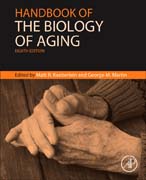
Handbook of the Biology of Aging, Eighth Edition, provides readers with an update on the rapid progress in the research of aging. It is a comprehensive synthesis and review of the latest and most important advances and themes in modern biogerontology, and focuses on the trend of 'big data' approaches in the biological sciences, presenting new strategies to analyze, interpret, and understand the enormous amounts of information being generated through DNA sequencing, transcriptomic, proteomic, and the metabolomics methodologies applied to aging related problems. The book includes discussions on longevity pathways and interventions that modulate aging, innovative new tools that facilitate systems-level approaches to aging research, the mTOR pathway and its importance in age-related phenotypes, new strategies to pharmacologically modulate the mTOR pathway to delay aging, the importance of sirtuins and the hypoxic response in aging, and how various pathways interact within the context of aging as a complex genetic trait, amongst others. Covers the key areas in biological gerontological research in one volume, with an 80% update from the previous editionEdited by Matt Kaeberlein and George Martin, highly respected voices and researchers within the biology of aging disciplineAssists basic researchers in keeping abreast of research and clinical findings outside their subdisciplinePresents information that will help medical, behavioral, and social gerontologists in understanding what basic scientists and clinicians are discoveringNew chapters on genetics, evolutionary biology, bone aging, and epigenetic controlProvides a close examination of the diverse research being conducted today in the study of the biology of aging, detailing recent breakthroughs and potential new directions INDICE: Understanding Aging Through Conserved Longevity Pathways (New)Role of the somatotropic Axis in Mammalian AgingMitochondria in aging: Dysfunction (new)Aging of Stem Cells: Intrinsic Changes and Environmental InfluencesTelomeres and Telomere Dysfunction in AgingmTOR: A Conserved Nutrient-Sensing Pathway that Determines Life-Span Across Species (new)Sirtuins in Aging and Age-Related DiseasesProtein Homeostasis and AgingGenetics of Human AgingCalorie Restriction in Nonhuman and Human Primates (new)Terminal Weight Loss, Frailty, and MortalityHuman Brain Myelination Trajectories Across the Life Span: Implications for CNS Function and DysfunctionAging and Adipose TissueAging and the Cerebral Microvasculature: Clinical Implications and Potential Therapeutic InterventionAging and Insulin SecretionCardiovascular Effects of Aging in Primates-Gender DifferencesCerebral Vascular Dysfunction with AgingPulmonary Function in Aging HumansBone Aging (new)Age-Related Changes in Thermoreception and ThermoregulationSex Differences in Longevity and AgingInflammation in Aging Processes: An Integrative and Ecological PerspectiveSystems Biology Approaches to Understanding Aging (new)Evolutionary Biology of Aging (new)Epigenetic Control of Longevity (new)An Objective Appraisal of the Free Radical Theory of AgingAging Research in 2014: Promise and Pitfalls (new)
- ISBN: 978-0-12-411596-5
- Editorial: Academic Press
- Encuadernacion: Rústica
- Páginas: 576
- Fecha Publicación: 27/10/2015
- Nº Volúmenes: 1
- Idioma: Inglés
